.NEXT 2015 Piter: Is it possible to press Moscow?
The .NET conference. NEXT , which conquered Moscow in December, has now again been held in its native Petersburg. This begs the question: is it possible after the capital’s span to make the St. Petersburg option not inferior, or will the inevitable pipe in the Northern Capital be lower and the smoke thinner? Under the cut - a detailed story that allows to draw conclusions.
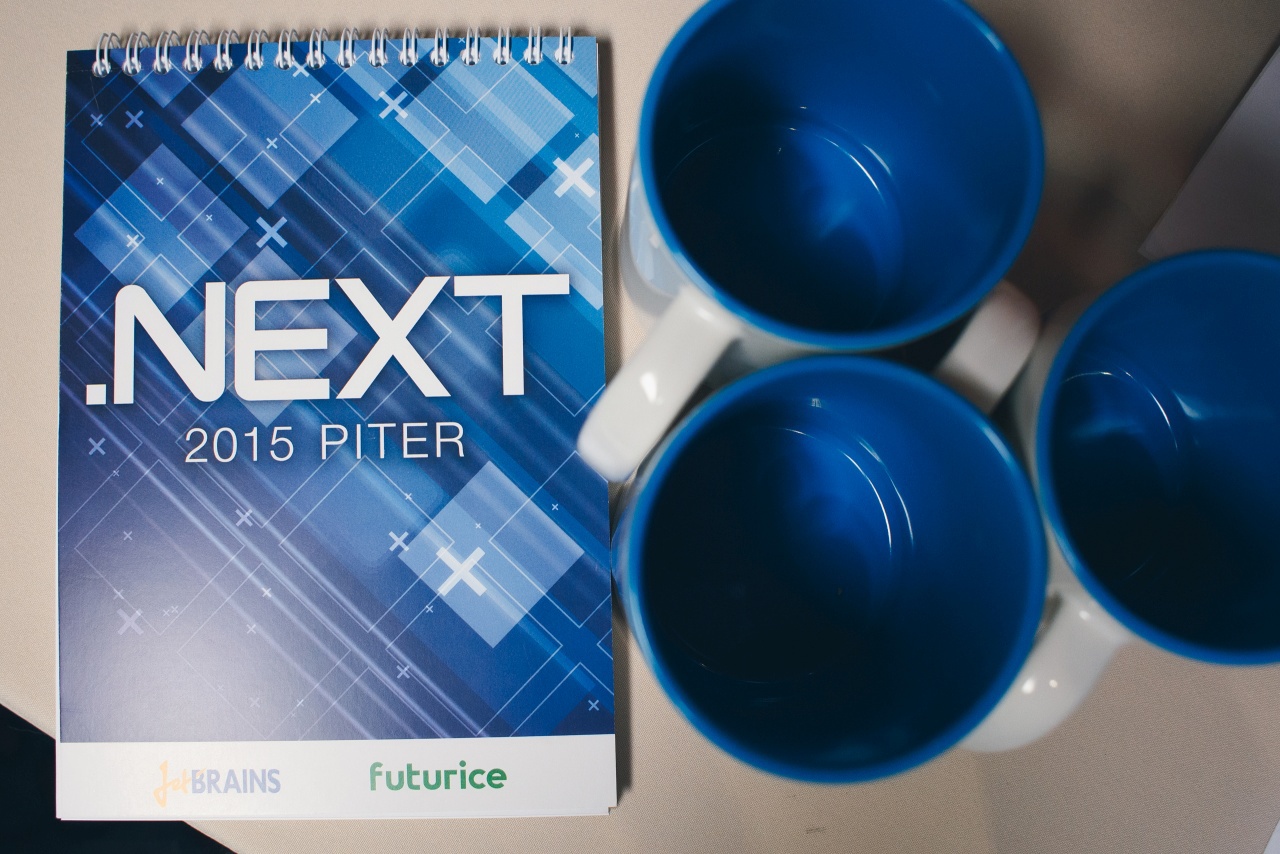
')
It would be foolish to argue with one fact: it is difficult for Petersburg IT conferences to struggle with Moscow in terms of the number of participants. The point is not only that the capital is bigger, but also that developers who come from other cities are much more willing to come to major events there. And St. Petersburg. NEXT in this parameter is predictably inferior to Moscow. But when choosing which of the two conferences to attend, the main criteria usually turn out to be different: the number and quality of reports, the composition of speakers, the level of organization. And here lies the main intrigue: is it possible in St. Petersburg with a smaller number of participants to maintain the same level?
Moscow .NEXT, which is positioned as “hardcore without marketing nonsense,” could simultaneously be fascinating with information on the case. In Petersburg this combination began even before the discovery: among the recruitment received by the participants at the entrance, there was a reminder of what questions should and should not be to speakers. Items like “if you already know the answer to your question, then you are not asking a question, but you are promoting yourself” caused smiles - but they were laughing just by pointing to the very real and familiar pain points, helping to avoid them.
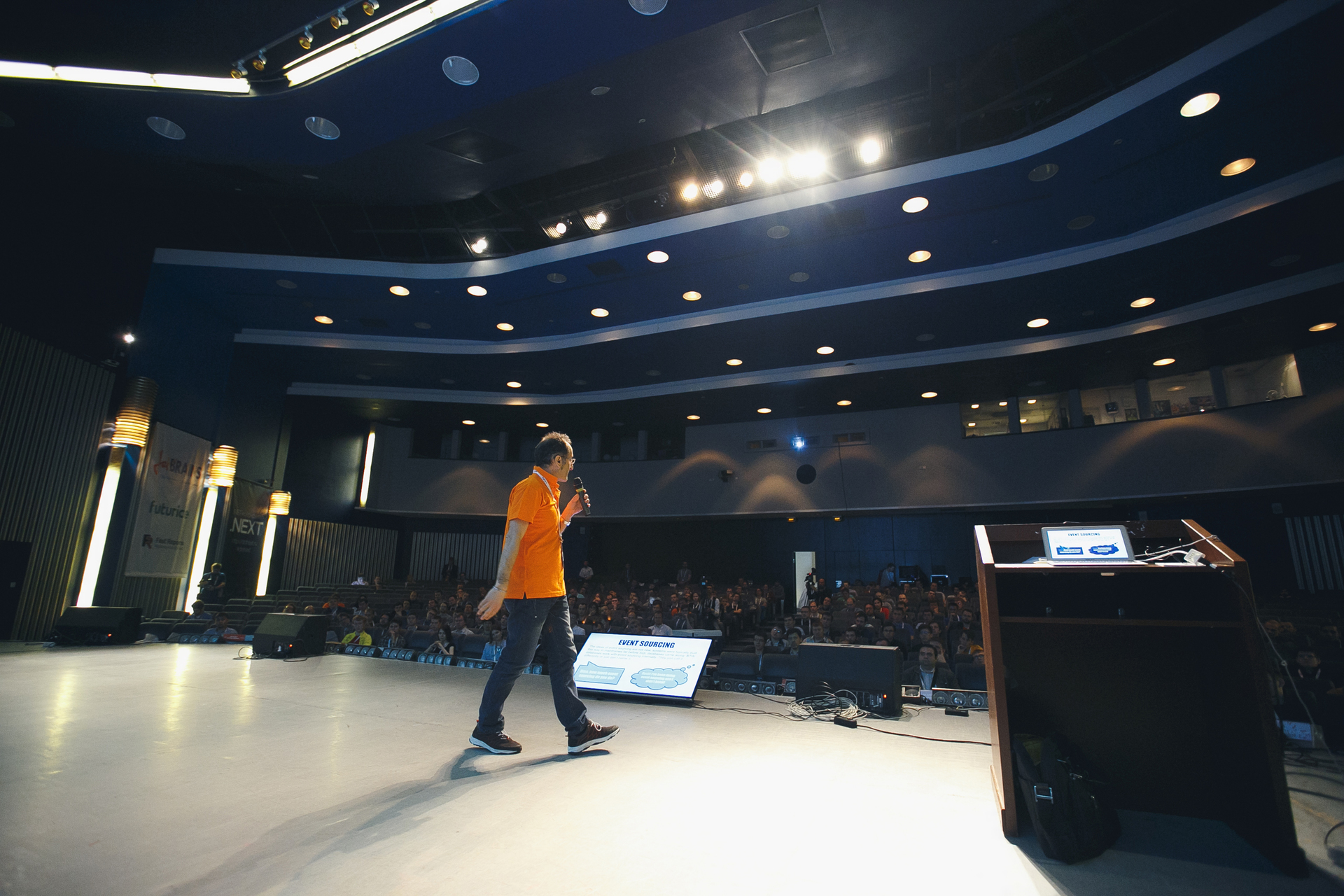
As in the case of the Moscow conference, the first speaker was Dino Esposito . The choice is, in general, the obvious one: in addition to its international prestige in the .NET world, he is known as a person who can turn a report into a vivid show, so it’s great for keynote (where the maximum number of technical details is more important than availability and brightness ). However, it is significant that both cities received the same stellar headliner: if the Petersburg version of the parochial, it would have been possible without a bird of such a flight.
And Dino did not disappoint: who else, talking about the use of technology, will lead his grandmother's phrases on slides? (“When I was a teenager I didn’t like the girl, my grandmother said:“ First wait until the problem arises, and then solve it. ”This is also true in the design”). He walked a bit tartly over how geek developers chased “nightly builds”, believing that this makes them cooler, and blindly use the most sensational technologies instead of selecting those that work best in their context.
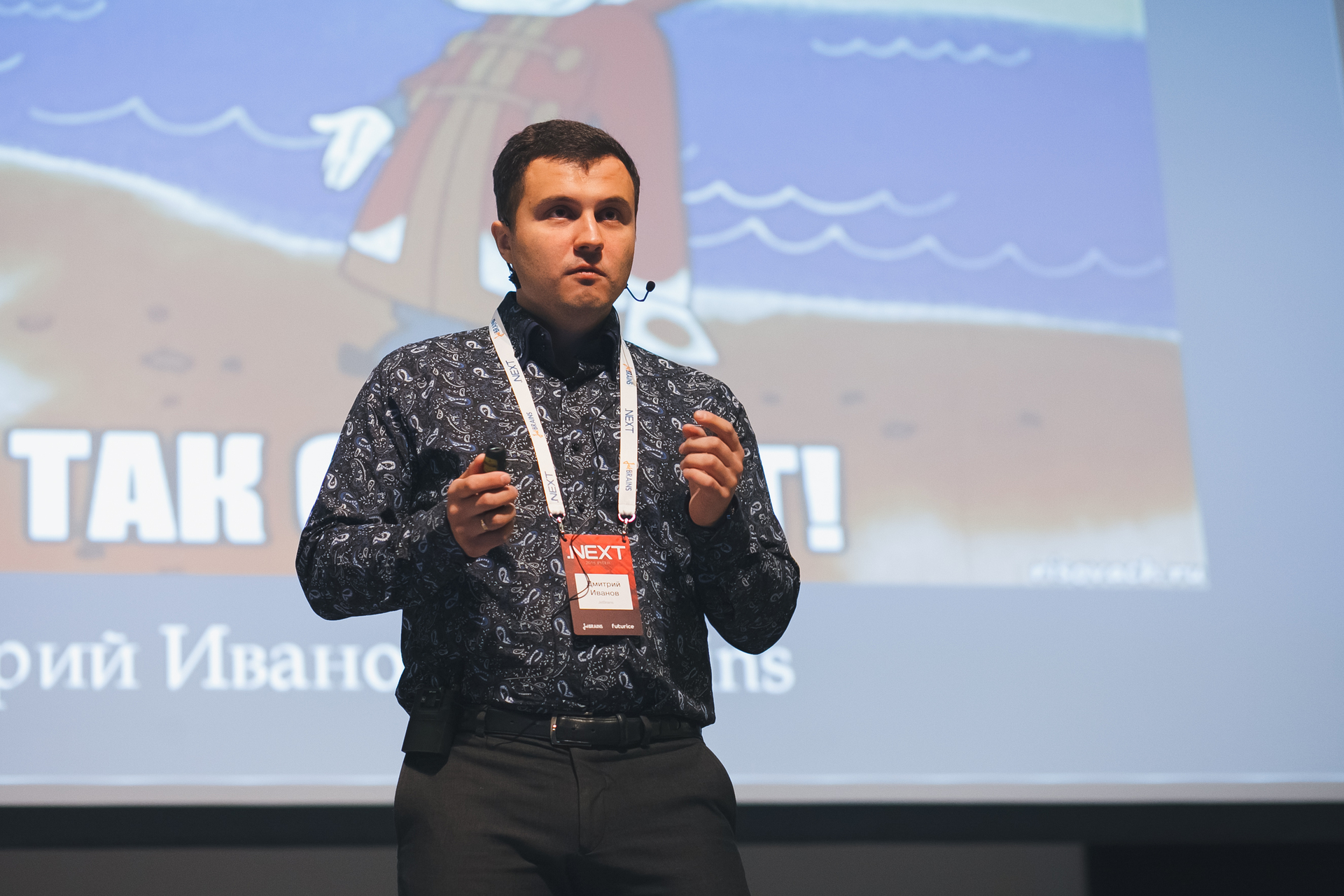
Dmitry Ivanov (JetBrains) followed the report “Tales of Premature Optimization” (illustrated by the frame “Vova in the Far East” - funny that the same cartoon in his presentation at the recent JPoint was used by Aleksey Shipilev). Starting with the classic quote by Donald Knuth, “Premature Optimization is the root of all evil,” he then contrasted her with his own “Premature Pessimization — the Root of All Evils.” Ivanov didn’t try to disprove Knut, rather, he complemented it. According to his statement, the developer goes through three stages in his development: at first he does not profile, because he has not yet realized the importance of this, then he profiles and optimizes the code thanks to this, and after that from a certain moment he can do without profiling. Ivanov admitted that at first he considered the second group to be the largest, but then experience showed that a pyramid is obtained: most of all, they have not even begun to profile, and no longer need it.
Then, on the main stage, Andrei Akinshin (Enterra) turned the subject to micro-optimization, remembering the same phrase Knut. His presentation used an interesting approach, which can be useful for a variety of technical speakers: all numbers were given not in absolute values, but in conditional “parrots”. As explained by Akinshin, the exact values do not provide additional useful information and only distract because they are too tied to a specific situation. And so, if somewhere there is one parrot against one and a half, the ratio becomes immediately clear - and does it play a major role in optimization?

Meanwhile, in the second hall, they talked about the enormous changes that are now taking place with Windows - not surprising, given that they directly affect the .NET world. Romuald Zdebsky of Microsoft explained the new strategy of Microsoft, aimed at combining all versions of Windows (running a unified Windows 10 will work a variety of devices from the "Internet of things" to glasses HoloLens). For developers, it is important that Windows 10 will not only be new, but also the latest major version of Windows: then the system will simply be updated itself. For a particular application, you can specify the range of versions in which it is supported.
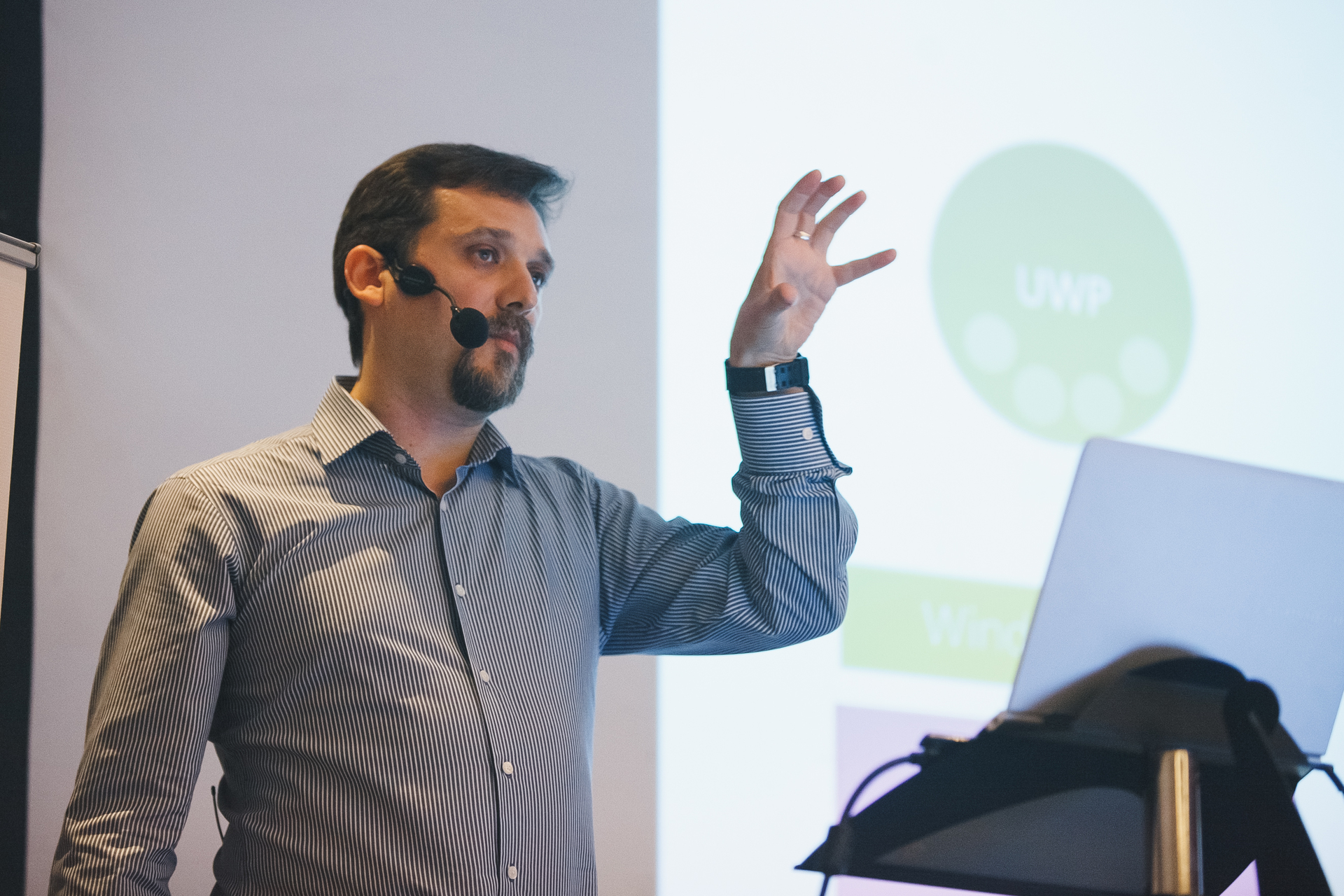
Following him, the theme of Windows 10 was developed by Mikhail Samarin ( Futurice ). He began his report “Universal Applications for WIndows 10” with the words “I warn you that something might not work,” because both Windows and Visual Studio and PowerPoint on his laptop were in pre-release versions - and this in itself It shows a change in Microsoft policy (the company had not so willingly provided access to its products before the official release). Since the new Windows will be able to run some applications on screens of completely different sizes, the question of adjusting to the screen interface is acute - and Samarin has demonstrated how it will work (approximately as an adaptive design for websites). He noted that even those who consider themselves exclusively mobile developers should not limit themselves to the interface for a five-inch screen: Continuum mode in Windows 10 assumes that the image from the phone can be output to a computer, even to a TV.

Later, Esposito occupied the main stage once again, already with a much more technical report “Common Scalability Practices that Just Work”. However, he didn’t get along without it here: “Scalability is like teenage sex: everyone talks about it, nobody can do it, everyone thinks that the others do it, and therefore everyone claims that they do it themselves”.
Then Kirill Skrygan compared ReSharper with Roslyn . One could reproach him for bias - Kirill works at JetBrains, that is, in essence, compared his product with someone else's - however, he himself began the presentation with honest confession that he had a personal interest in this matter. And bias could have become a problem if he simply described how wonderful ReSharper is - however, the performance was much more balanced. And at the same time, it was colorful: as an illustration, the battle of the Katnarok dlinokot was used , which helped to revive the audience, who was tired by the end of the day.
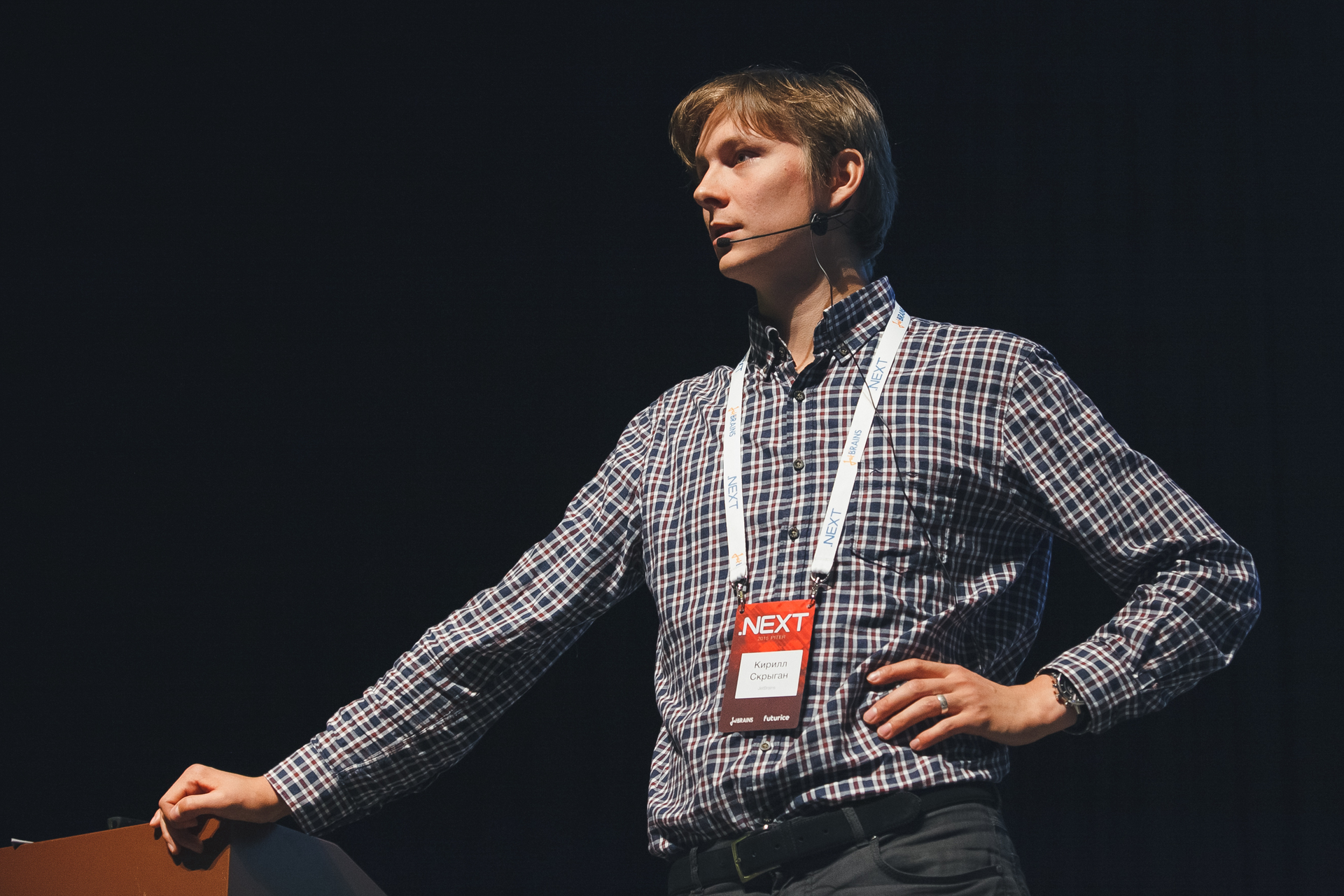
Due to the fact that in the evening the attention of the public is scattered, in the schedule of conferences the latest reports may turn out to be losing ones: “anyway, no one really will hear them”. But not in this case: following the results of the viewer feedback, it turned out that “F # Magic for data processing: monads, type providers, and some machine learning” by Dmitry Soshnikov (Microsoft) , who completed the program in the second hall, accepted the best of all reports. And Roman Belov (JetBrains) , who occupied the same last slot on the main stage with the “Memory Testing Unit” report, in December became the public's favorite following the Moscow conference. That is, for St. Petersburg powerful speakers do not have to scrape the bottom of the barrel - they are enough for the whole day.
What is the result? The St. Petersburg and Moscow conferences were somewhat similar (for example, each took place in three rooms at the same time), but differed in something — and one cannot say that one was better than the other; The smaller size of Petersburg did not prevent him from keeping the brand. In the eternal dispute between the two cities and in this case, as in many others, there was no clear winner. But this party is not over yet, and for Moscow the next move: in December. NEXT will take place again there. Now there is a collection of applications from those who wish to speak there - so that you have the opportunity to personally influence what the conference will be like.
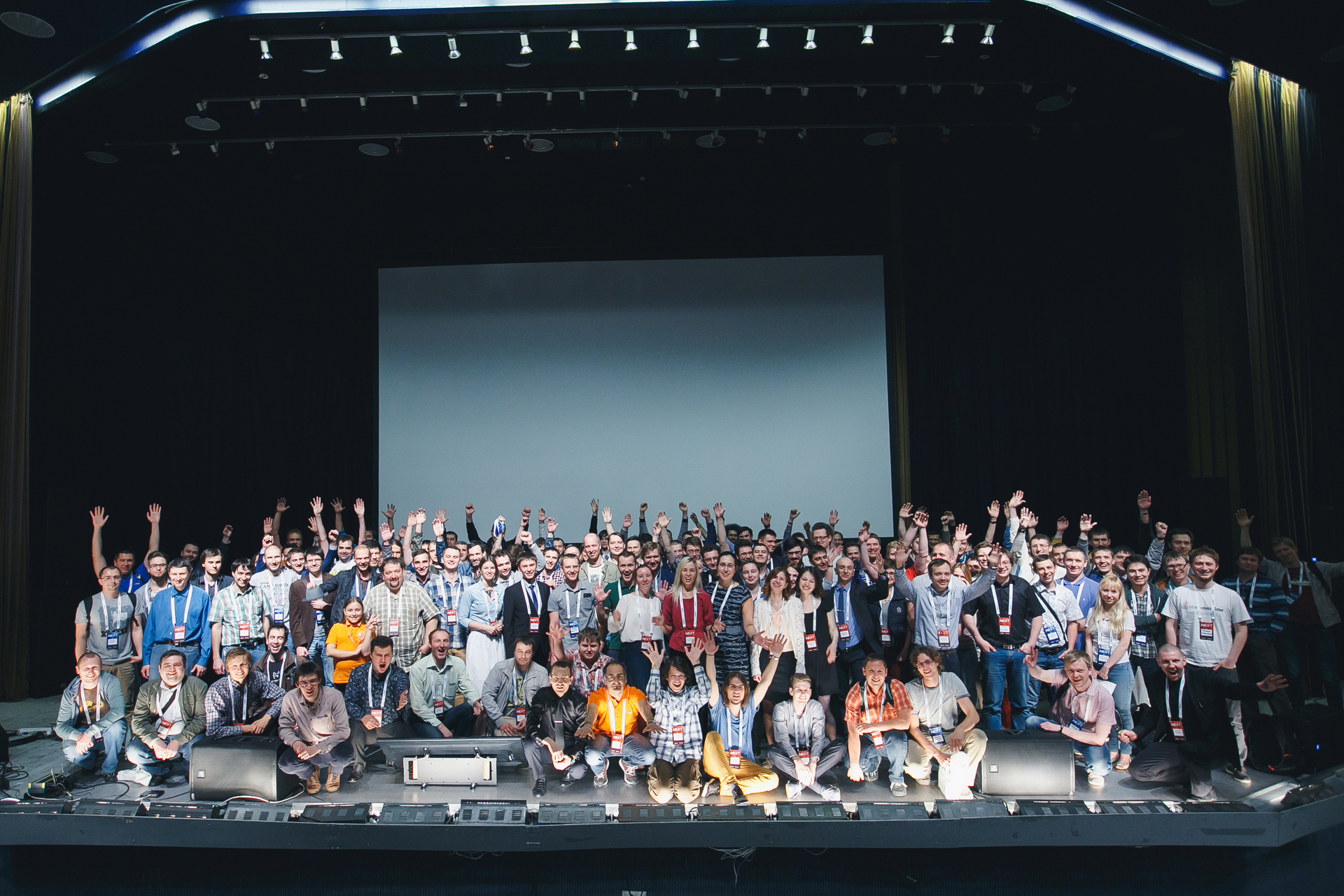

')
It would be foolish to argue with one fact: it is difficult for Petersburg IT conferences to struggle with Moscow in terms of the number of participants. The point is not only that the capital is bigger, but also that developers who come from other cities are much more willing to come to major events there. And St. Petersburg. NEXT in this parameter is predictably inferior to Moscow. But when choosing which of the two conferences to attend, the main criteria usually turn out to be different: the number and quality of reports, the composition of speakers, the level of organization. And here lies the main intrigue: is it possible in St. Petersburg with a smaller number of participants to maintain the same level?
Moscow .NEXT, which is positioned as “hardcore without marketing nonsense,” could simultaneously be fascinating with information on the case. In Petersburg this combination began even before the discovery: among the recruitment received by the participants at the entrance, there was a reminder of what questions should and should not be to speakers. Items like “if you already know the answer to your question, then you are not asking a question, but you are promoting yourself” caused smiles - but they were laughing just by pointing to the very real and familiar pain points, helping to avoid them.

As in the case of the Moscow conference, the first speaker was Dino Esposito . The choice is, in general, the obvious one: in addition to its international prestige in the .NET world, he is known as a person who can turn a report into a vivid show, so it’s great for keynote (where the maximum number of technical details is more important than availability and brightness ). However, it is significant that both cities received the same stellar headliner: if the Petersburg version of the parochial, it would have been possible without a bird of such a flight.
And Dino did not disappoint: who else, talking about the use of technology, will lead his grandmother's phrases on slides? (“When I was a teenager I didn’t like the girl, my grandmother said:“ First wait until the problem arises, and then solve it. ”This is also true in the design”). He walked a bit tartly over how geek developers chased “nightly builds”, believing that this makes them cooler, and blindly use the most sensational technologies instead of selecting those that work best in their context.

Dmitry Ivanov (JetBrains) followed the report “Tales of Premature Optimization” (illustrated by the frame “Vova in the Far East” - funny that the same cartoon in his presentation at the recent JPoint was used by Aleksey Shipilev). Starting with the classic quote by Donald Knuth, “Premature Optimization is the root of all evil,” he then contrasted her with his own “Premature Pessimization — the Root of All Evils.” Ivanov didn’t try to disprove Knut, rather, he complemented it. According to his statement, the developer goes through three stages in his development: at first he does not profile, because he has not yet realized the importance of this, then he profiles and optimizes the code thanks to this, and after that from a certain moment he can do without profiling. Ivanov admitted that at first he considered the second group to be the largest, but then experience showed that a pyramid is obtained: most of all, they have not even begun to profile, and no longer need it.
Then, on the main stage, Andrei Akinshin (Enterra) turned the subject to micro-optimization, remembering the same phrase Knut. His presentation used an interesting approach, which can be useful for a variety of technical speakers: all numbers were given not in absolute values, but in conditional “parrots”. As explained by Akinshin, the exact values do not provide additional useful information and only distract because they are too tied to a specific situation. And so, if somewhere there is one parrot against one and a half, the ratio becomes immediately clear - and does it play a major role in optimization?

Meanwhile, in the second hall, they talked about the enormous changes that are now taking place with Windows - not surprising, given that they directly affect the .NET world. Romuald Zdebsky of Microsoft explained the new strategy of Microsoft, aimed at combining all versions of Windows (running a unified Windows 10 will work a variety of devices from the "Internet of things" to glasses HoloLens). For developers, it is important that Windows 10 will not only be new, but also the latest major version of Windows: then the system will simply be updated itself. For a particular application, you can specify the range of versions in which it is supported.

Following him, the theme of Windows 10 was developed by Mikhail Samarin ( Futurice ). He began his report “Universal Applications for WIndows 10” with the words “I warn you that something might not work,” because both Windows and Visual Studio and PowerPoint on his laptop were in pre-release versions - and this in itself It shows a change in Microsoft policy (the company had not so willingly provided access to its products before the official release). Since the new Windows will be able to run some applications on screens of completely different sizes, the question of adjusting to the screen interface is acute - and Samarin has demonstrated how it will work (approximately as an adaptive design for websites). He noted that even those who consider themselves exclusively mobile developers should not limit themselves to the interface for a five-inch screen: Continuum mode in Windows 10 assumes that the image from the phone can be output to a computer, even to a TV.

Later, Esposito occupied the main stage once again, already with a much more technical report “Common Scalability Practices that Just Work”. However, he didn’t get along without it here: “Scalability is like teenage sex: everyone talks about it, nobody can do it, everyone thinks that the others do it, and therefore everyone claims that they do it themselves”.
Then Kirill Skrygan compared ReSharper with Roslyn . One could reproach him for bias - Kirill works at JetBrains, that is, in essence, compared his product with someone else's - however, he himself began the presentation with honest confession that he had a personal interest in this matter. And bias could have become a problem if he simply described how wonderful ReSharper is - however, the performance was much more balanced. And at the same time, it was colorful: as an illustration, the battle of the Katnarok dlinokot was used , which helped to revive the audience, who was tired by the end of the day.

Due to the fact that in the evening the attention of the public is scattered, in the schedule of conferences the latest reports may turn out to be losing ones: “anyway, no one really will hear them”. But not in this case: following the results of the viewer feedback, it turned out that “F # Magic for data processing: monads, type providers, and some machine learning” by Dmitry Soshnikov (Microsoft) , who completed the program in the second hall, accepted the best of all reports. And Roman Belov (JetBrains) , who occupied the same last slot on the main stage with the “Memory Testing Unit” report, in December became the public's favorite following the Moscow conference. That is, for St. Petersburg powerful speakers do not have to scrape the bottom of the barrel - they are enough for the whole day.
What is the result? The St. Petersburg and Moscow conferences were somewhat similar (for example, each took place in three rooms at the same time), but differed in something — and one cannot say that one was better than the other; The smaller size of Petersburg did not prevent him from keeping the brand. In the eternal dispute between the two cities and in this case, as in many others, there was no clear winner. But this party is not over yet, and for Moscow the next move: in December. NEXT will take place again there. Now there is a collection of applications from those who wish to speak there - so that you have the opportunity to personally influence what the conference will be like.

Source: https://habr.com/ru/post/260481/
All Articles